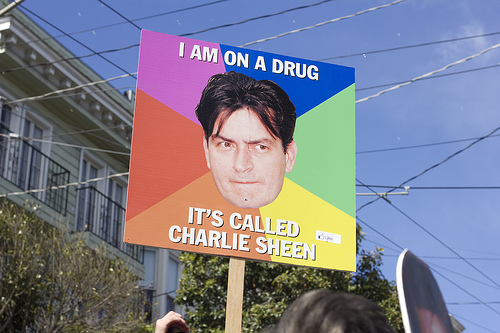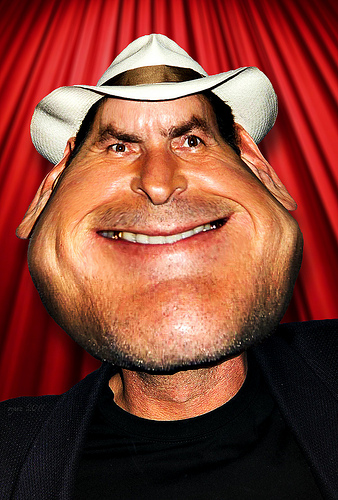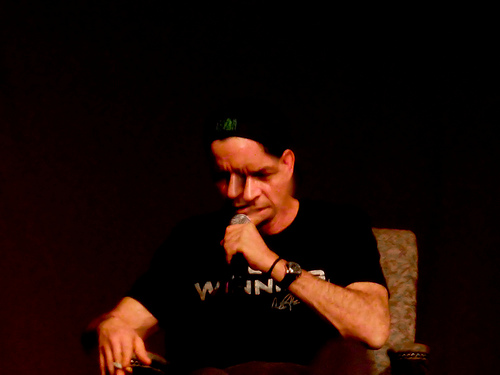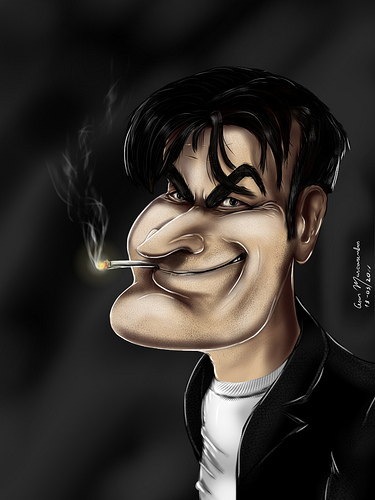
In his Today Show interview revealing his HIV diagnosis, well known actor Charlie Sheen insisted that he no longer feels the stigma associated with HIV. In a predictably hypocritical manner, he made this proclamation mere minutes after he perpetuated the stigmatization of sex workers—interviewer Matt Lauer quoted the open letter he’d posted to his fans in which he called sex workers “unsavory and insipid types” and Sheen confirmed his written statements.
Quick to cast himself as the victim and the sex workers he saw as villainous temptresses, he claimed his public statement was made in response to one blackmailing sex worker who threatened to disclose his status. Sheen complained, “What people forget is that that’s money [blackmailers are] taking from my children.” As opposed to the millions of dollars Sheen spent in the past 35 years on sex workers that could also have gone to his kids? Apparently, that money is entirely different.
Sheen tarred all sex workers with a black brush based off of the actions of the one sex worker who threatened to out him. Considering the high number of sex workers he hired, it’s unfair to call any of us “unsavory” whores. If anything, all the sex workers Sheen frequented who said nothing about his status for years demonstrate the high value we place on client confidentiality in this industry. But by painting sex workers as unethical, Sheen got to proudly proclaim himself stigma free, as we bear the brunt of stigma for him.

Contrary to popular belief, it is not occupational hazard which renders sex workers vulnerable to contracting HIV at higher rates—it’s social stigma. Stigma is what influences the implementation of legal policies that fail to protect us, which increase our risk of sexual assault. Stigma limits our ability to negotiate safer sex practices, seek adequate health care, and obtain resources which could prevent HIV transmission. Sheen painted a favorable portrait of himself at the cost of contributing to widespread whorephobic notions which increase our odds of contracting HIV.
Being thrown under the bus for someone’s personal gain is an all too common phenomenon in sex workers’ lives. Almost every sex worker I know has some experience with people in our lives leveraging their association with us for gain and then reneging because we are convenient scapegoats: “I love my porn star girlfriend,” our partners say, then blame the demise of relationships on our jobs. Married clients benefit from the intimacy and companionship escorts offer them during tough times in their marriages. But when their wives catch them, they blame their infidelities on us rather than taking responsibility for actively pursuing our services. The sex worker as scapegoat is nothing new, but being used that way further relegates us to the margins.
Often, sex workers draw a distinction between our clients and personal partners. Separating the two helps us navigate our personal and professional relationships. However, both clients and partners are capable of turning on us once they’re done benefiting from our sexual and emotional labor. As both the personal partner and client of sex workers, Sheen demonstrates how both can betray us in his vicious open letter.
Every time a civilian selfishly calls out a sex worker for personal gain, individual sex workers suffer. On the macro level, every instance like this that passes without challenge contributes to the stigmatization of sex workers. Sheen and his ilk serve to cement commonly held notions of our population by society.

An escort who claims to have been hired by Sheen eloquently points out that in Hollywood, holding celebrities accountable “carries even more stigma than sex work does.” Stigma certainly operates both inside and outside the confines of Hollywood, but the vast majority of those affected by HIV are not afforded the same privileges as celebrities. Those affected by stigma—HIV positive people, sex workers, and of course HIV positive sex workers—experience it at both the micro and macro level. These experiences are highly varied and influenced by one’s identity and social status. In order to combat stigma, one cannot simply examine it through personal experience. Understanding the broader social situation and its structural inequalities is imperative.
Sheen boasted on the Today Show that, “If there’s one guy on this planet to contract this that’s gonna deliver a cure, it’s me.”
While finding a cure for HIV is certainly important, it is only one piece of the puzzle. According to the Center for Disease Control, the key to curbing the HIV epidemic lies in prevention: In addition to reducing new infections and achieving a more coordinated national response, the National HIV/AIDS Strategy stresses the importance of increasing and improving access to health care for those living with HIV. Rather than exclusively aiming to find a cure, it is vital to employ the resources we already have at our disposal to prevent transmission. However, doing so requires shifting the focus from the individual to the collective, recognizing structural inequalities, and utilizing one’s place of privilege to the advantage of the movement. Thus far, Sheen has done none of these things–instead he’s utilized his privilege for his own benefit.
Sheen avowed that as an HIV activist, “I will not shun away from responsibilities and opportunities that drive me to helping others…. I will pick my spots carefully and respectfully.”

Yet, Sheen has only been public about his HIV for mere days, and he has already demonstrated willful disregard for helping others affected by the virus. He must be well aware that a celebrity of his caliber will undoubtedly be seen by the public as an authority figure on HIV, and he’s already used that authority to promote whorephobia and derail discussions of prevention for those who need it most. At least Sheen is correct when he says he won’t be the “poster man” for HIV. Sheen isn’t the new face of HIV because the people who should be the face of HIV, the ones who are suffering the hardest, such as HIV positive sex workers, are rendered faceless by the very people who claim to want to help. If Sheen truly wants to come to their aid, it’ll take a lot more than just writing a check.
The relationship between HIV and sex work stigma is deeply intertwined. Sex workers are often viewed as HIV Typhoid Marys when actually, we play an effective role in curbing the HIV epidemic when working in ideal conditions in partnership with governments and NGOs. Sheen may not have directly blamed sex workers for his HIV status, but he certainly didn’t help dispel the myth of sex workers as vectors of disease. Maintaining pristine sexual health is a top concern in our line of work— without it we wouldn’t have income. It is clients like Sheen that fuel HIV transmission, when they pressure us to offer “bareback”services and then act as the link between sex workers and the general population. So far two sex workers have come forward stating that Sheen proposed having unprotected sex. Based on this information, it seems Sheen is more likely to be responsible for transmitting HIV than his sex worker counterparts.
An important step to finding the cure to HIV is eliminating its stigma. Sheen may claim he no longer experiences stigma. But by perpetuating stigma against sex workers, emphasizing a cure rather than harm reduction, focusing on himself, and ignoring the bigger picture, Sheen increases stigma against those less privileged than himself, making them more vulnerable to HIV infection.
Sheen stated, “I release myself from this prison today.” But he does so still solitary, not in solidarity. He took an opportunity for collective action to benefit HIV positive people and capitalized on it for his own benefit. Perhaps when Sheen says that he no longer experiences stigma, he means that he’s released himself from the personal prison of accountability—leaving sex workers to suffer in his stead.
Well written and unfortunately, so very true. It’s amazing to me that people like him can absolve themselves of all accountability for actions they initiated, engaged in and paid for, then throw the providers under the bus. It’s a step backward for sex workers everywhere, but the movement and advocacy is still gaining more traction than ever and we’ll keep working until things change.
Excellent article, well-written and vital to an intelligent discussion of social stigma, the legitimization of sex work, and (maybe) well-intended but terribly biased people of authority like Charlie Sheen. Thank you for bringing this point of view to our attention.